[ad_1]
Some customer relationship management providers offer free versions of their software that come with limited access to their features while still providing the value of a paid tier and managing customer relations. Typically, free CRM software is capped at a certain number of users, making it most ideal for small businesses or even freelancers.
These free versions can be sufficient for organizations since they can still provide the core and advanced CRM features users need to organize and track client engagements.
Top free CRM software comparison
The top free CRM software offers access to pipeline and document management, a mobile app or offline access, and native or third party integrations. This way, businesses can sync their free CRM tool to their existing tech stack and integrate it with their sales process.
Beyond these features, some additional functions can be included or added for small monthly fees.
| Software | Pipeline management | Documentation tracking | Mobile app | Integrations | Pricing |
|---|---|---|---|---|---|
| HubSpot CRM | Yes | Yes | Yes | Yes | Free for up to 2,500 users |
| Zoho CRM | Limited | Yes | Yes | Yes | Free up to 3 users |
| EngageBay | Yes | Yes | No | Yes | Free for up to 15 users |
| Freshsales | Yes | Limited | Yes | Yes | Free up to 3 users |
| Insightly | Yes | Limited | No | Yes | Free up to 2 users |
| Capsule | Limited | Yes | Yes | Yes | Free up to 2 users |
| monday sales CRM | Yes | Limited | Yes | Yes | Free for students and nonprofits |
HubSpot CRM: Best overall free CRM

HubSpot’s free CRM comes with access to a range of both marketing and sales tools. Users can complete sales tasks directly within a customer’s profile and monitor incoming deals in the free pipeline feature. Allowing up to 2,500 users grants unbeatable access to HubSpot’s native and third party integrations. HubSpot’s paid tiers offer more commerce features for quotes, invoices and payment links.
Pricing for paid tiers
- Starter: $20 per 2 users per month, billed annually, or $30 when billed monthly.
- Professional: $1,600 per 5 users per month, billed annually, or $1781 when billed monthly.
- Enterprise: $5,000 per 10 users per month, with an annual commitment.
Features
- AI email writer: Use AI to generate sales outreach emails to help drive email marketing.
- Meeting scheduler: Schedule client meetings fast with little hassle with syncs to Google Calendar and Office 365 Calendar.
- Live chat software: Connect website visitors to sales reps in real time to convert new prospects, improve customer relations and close more deals (Figure A).
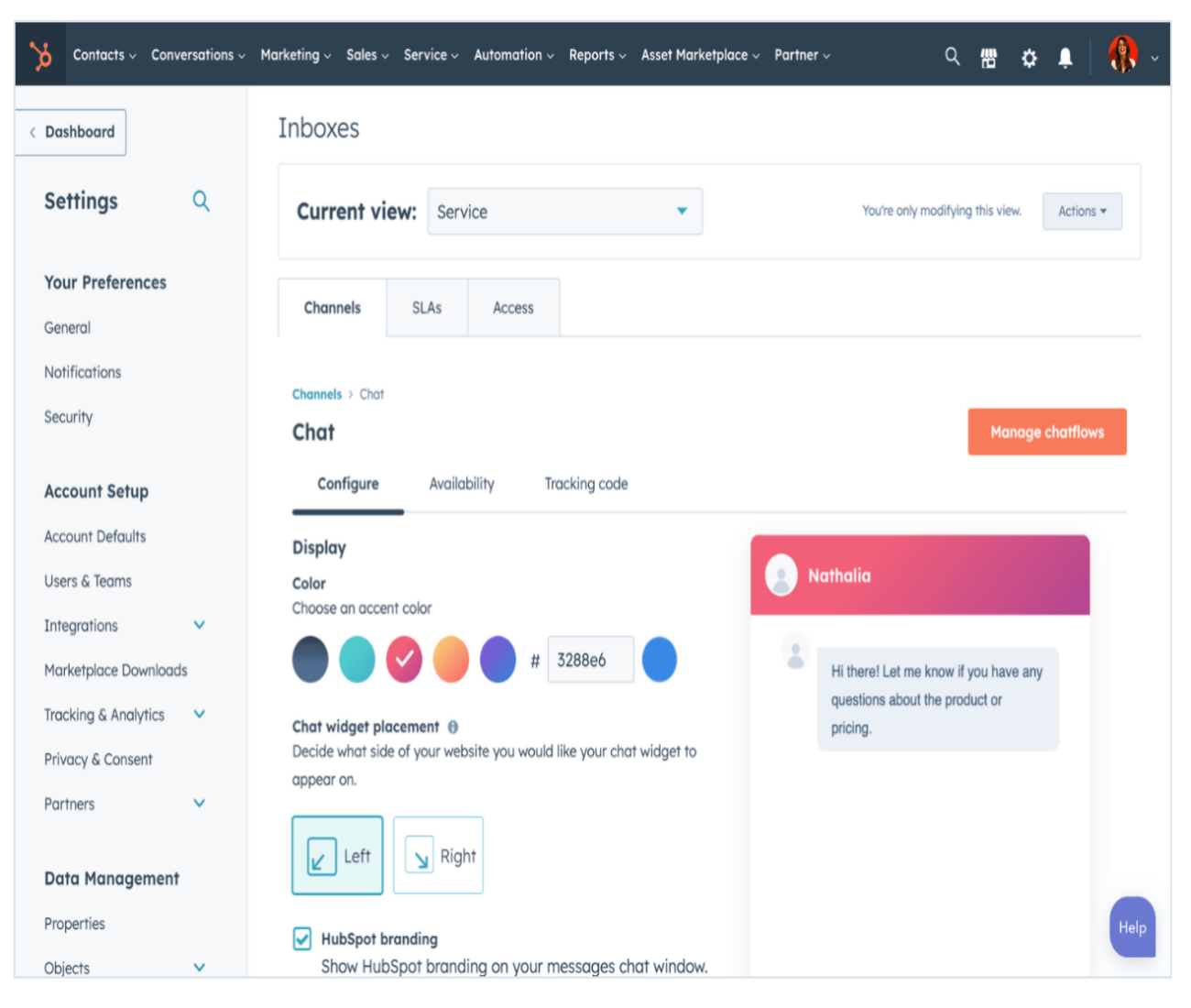
HubSpot CRM pros and cons
| Pros | Cons |
|---|---|
| Intuitive user interface. | Paid plans and add-ons can be pricey. |
| Robust sales and marketing tools. | There is a lack of reporting tools. |
| Relatively easy onboarding and CRM implementation. | There is no live support for free users. |
Features
- Lead tracking: View lead profiles and activity history from one dashboard to know where they are in the buying process and when the best time is to start engaging more.
- Document management: Organize and control all shared documents between sales reps and even content shared outside the business with clients.
- Zia AI-tool: Monitor lead activity or even access forecasting insights by just asking Zoho’s AI assistant directly (Figure B).
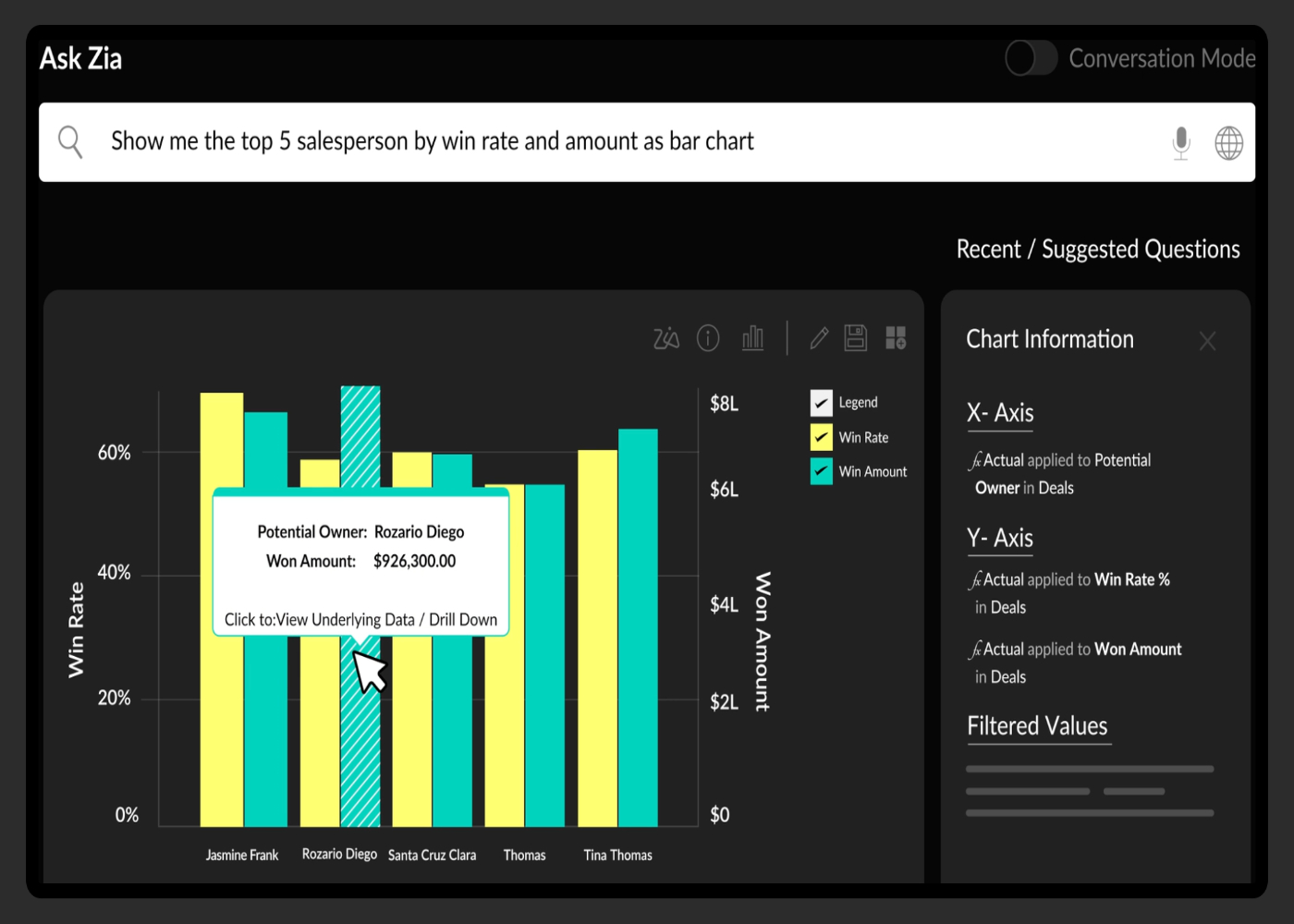
Zoho CRM pros and cons
| Pros | Cons |
|---|---|
| 15-day free trial. | Free plan has no social integration. |
| Robust sales forecasting. | Some users report poor UI and UX. |
| 24/7/365 data security. | User reports of platform learning curve. |
SEE: For more information, read the full Zoho CRM review.
Features
- Multi-channel campaigns: Create branded marketing campaigns that can be deployed across multiple channels, such as email, website and social media.
- Lead scoring: Segment and prioritize incoming leads based on preset criteria from an organization’s ideal customer profile.
- Website lead capture: Collect and store website visitor information with pop ups and landing pages (Figure C).
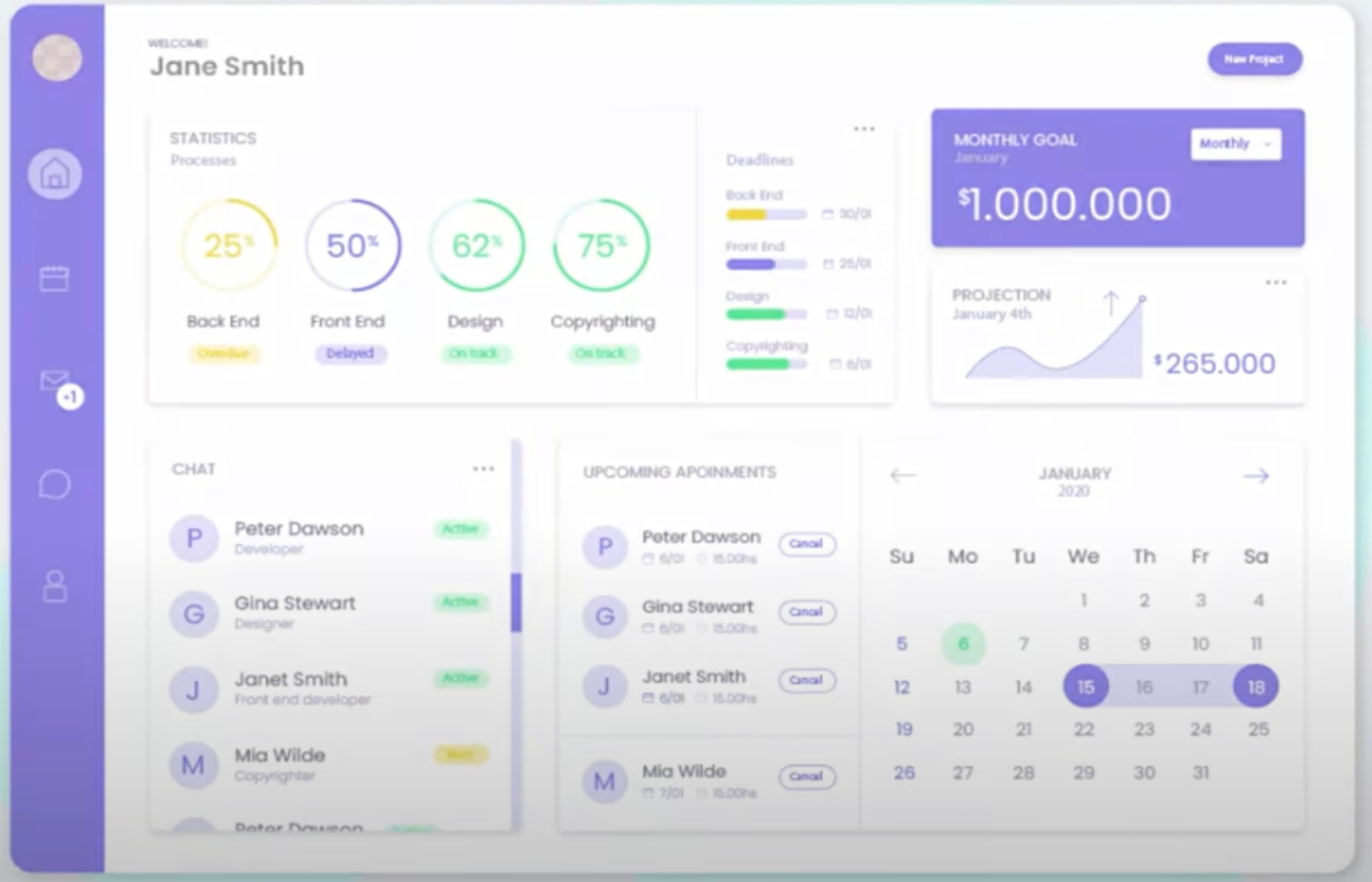
EngageBay pros and cons
| Pros | Cons |
|---|---|
| Multiple billing options. | Paid tiers might require long commitments. |
| 360-customer views. | Third-party integrations are limited. |
| Predictive lead scoring. | Email scheduling is limited to Growth and Pro tiers. |
Features
- Contact lifecycle stages: Capture the sales lifecycle each individual lead is at with customizable stages.
- Freddy AI copilot: Activate Freshsales AI assistant, Freddy, to parse emails and analyze historical lead data.
- Email templates: Create preset templates to engage with new leads quickly (Figure D).
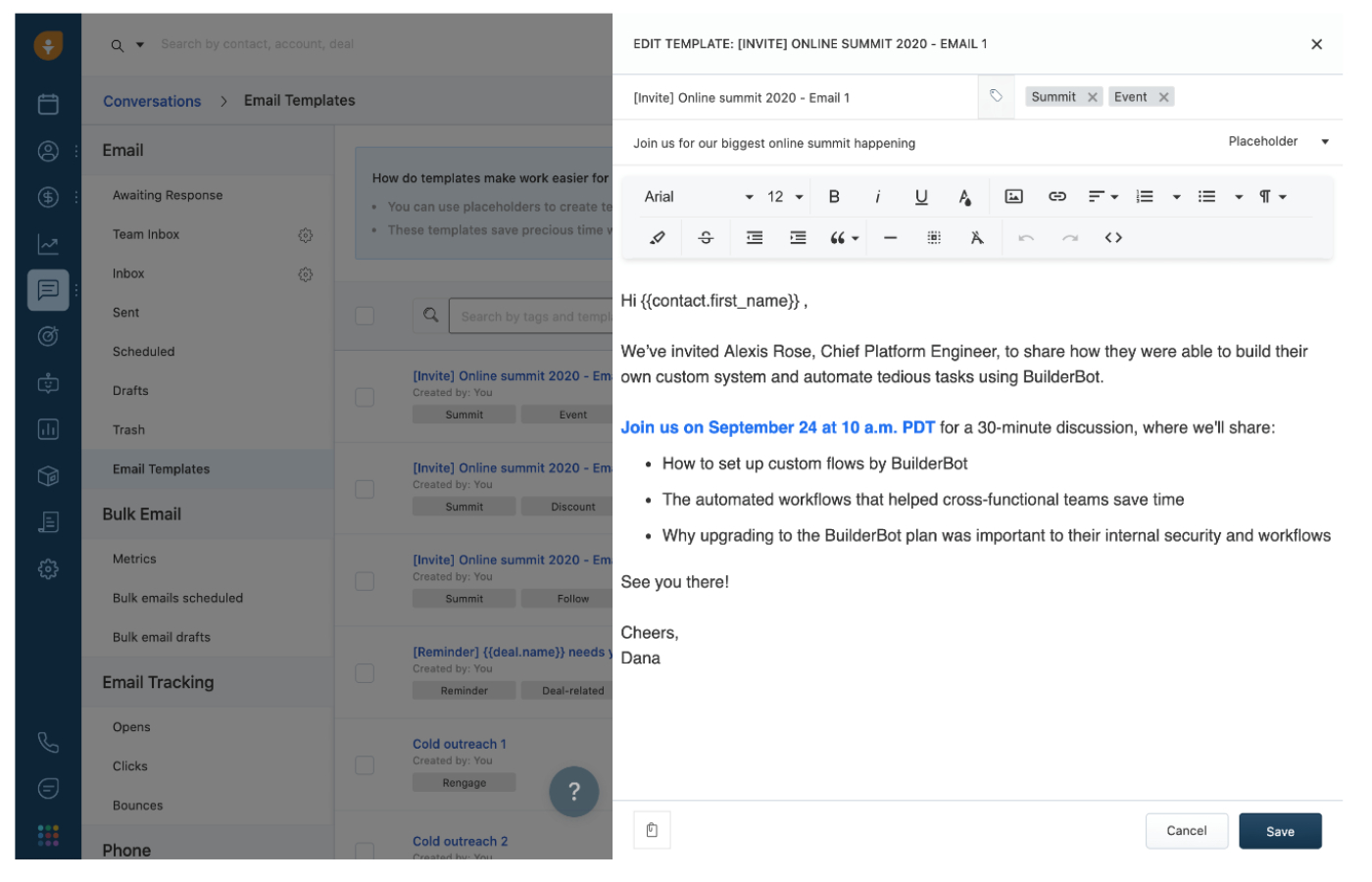
Freshsales pros and cons
| Pros | Cons |
|---|---|
| 21-day free trial. | No workflows offered in the free tier. |
| 24/5 customer support via phone, email and chat. | Marketing features are limited. |
| Kanban dashboard views. | Some core features aren’t offered in the free tier. |
SEE: For more information, read the full Freshsales review.
Insightly: Best free CRM for project management
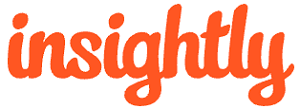
Insightly’s free CRM includes access for two users and up to 2,500 records, 5 email templates, 10 emails per day and more. This allows for basic contact and pipeline management, as well as an additional pipeline for project management. Within the software, users can create highly visual workflows through colorful kanban boards. If you want lead scoring and routing functions, users need to upgrade to the Professional or Enterprise tiers.
Pricing for paid tiers
- Plus: $29 per user per month, billed annually.
- Professional: $49 per user per month, billed annually.
- Enterprise: $99 per user per month, billed annually.
Features
- Native integrations: Access integrations to apps like QuickBooks Online, PandaDoc and Xero.
- Email management: Allow complete visibility across teams on every customer email interaction.
- Sales pipelines: Capture relevant details about each incoming lead and track where they are in your sales process (Figure E).
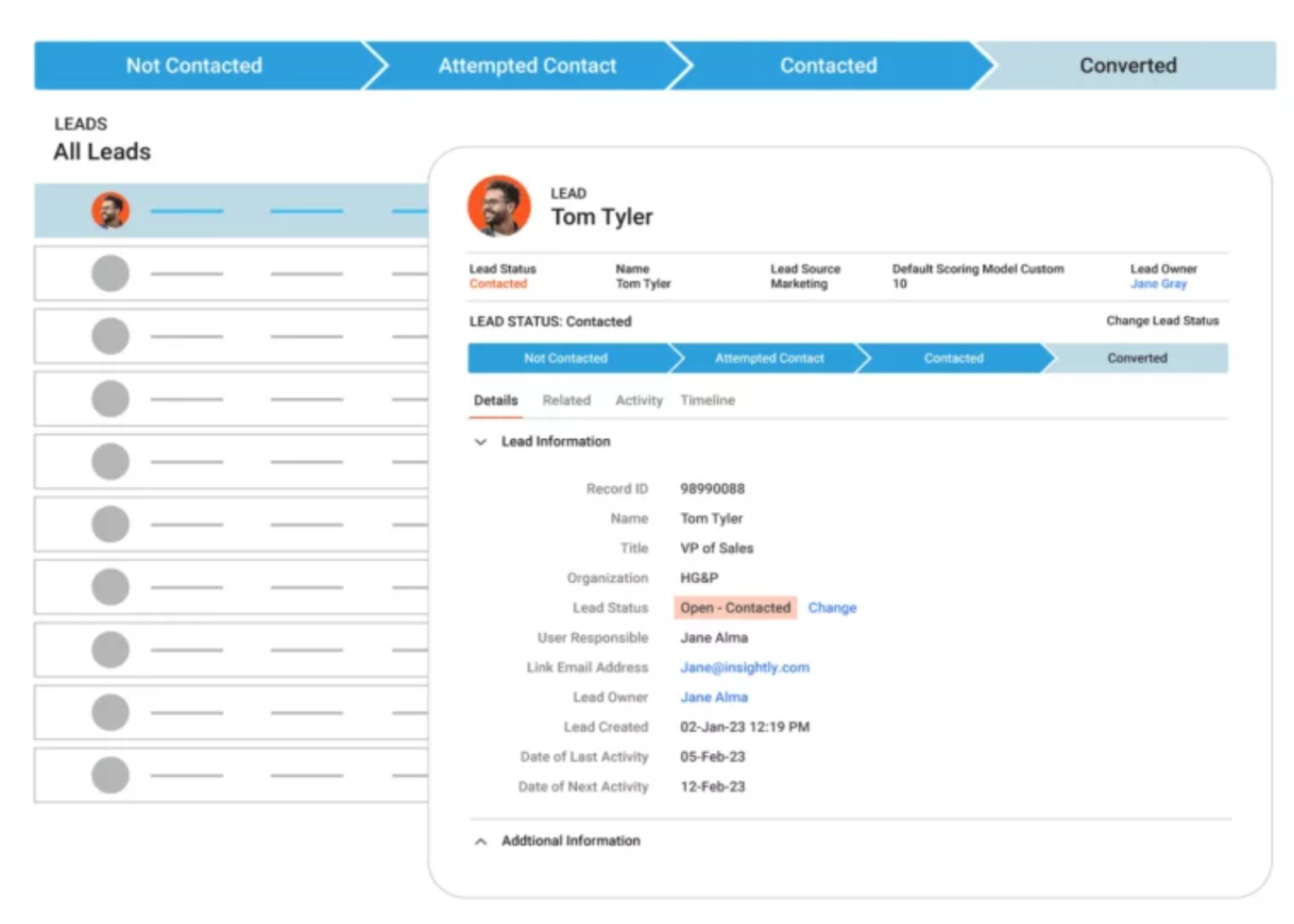
Insightly pros and cons
| Pros | Cons |
|---|---|
| 14-day free trial. | User support costs extra. |
| 1,000+ app third party and native integrations. | Free version only supports two custom fields. |
| 5 free email templates. | Only access community forums with premium plans. |
Capsule: Best for project management

Capsule is a simple online CRM with powerful sales and relationship management tools. Capsule’s free version allows up to two users, 250 contacts and 50MB of storage space. Users can manage sales opportunities with project management tools to plan events or track customer activities, such as support queries or onboarding. Every tier, including their free version, allows for daily task reminders and AI content assistance. Upgrade to a paid subscription for better user permissions and advanced reporting.
Pricing for paid tiers
- Starter: $18 per user per month when billed annually, or $21 when billed monthly.
- Growth: $36 per user per month when billed annually, or $38 when billed monthly.
- Advanced: $54 per user per month when billed annually, or $60 when billed monthly.
- Ultimate: $72 per user per month when billed annually, or $75 when billed monthly.
Features
- Opportunity highlights: Notify reps when leads are consistently inactive or opportunities are considered stale.
- Two factor authentication: Confirm user security when anyone tries to access your CRM through the mobile app.
- Workflow automation: Automate sales workflows to make sales tasks quicker and more consistent (Figure F).
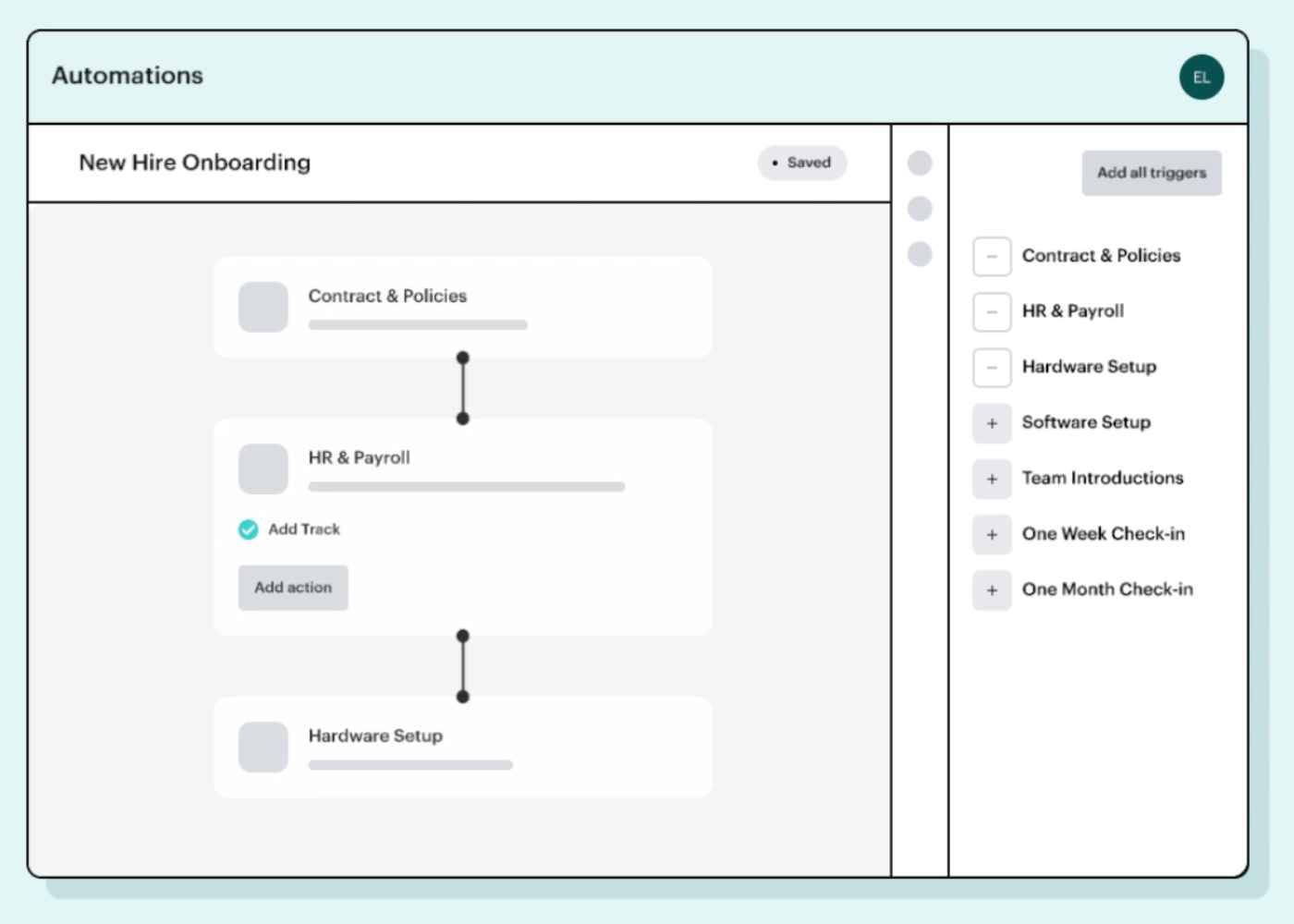
Capsule pros and cons
| Pros | Cons |
|---|---|
| 14-day free trial. | No custom automations available in the free tier. |
| 1,000+ available integrations. | No assigned sales teams or support. |
| Exporting for data security. | Doesn’t integrate with Outlook calendar. |
monday sales CRM: Best free CRM for students or nonprofits

monday sales CRM offers a range of essential features as well as tools for improving productivity and customer relationships. It is important to note only students or nonprofits can access monday.com for free or at a highly discounted price after filling out relevant forms. Monday.com’s customizable dashboard and pipelines does make it great for task management. But if your organization doesn’t fall within the industry categories for the discount, monday’s basic CRM tier is relatively still affordable. Upgrade to the Pro CRM tier for better access to sales analytics.
Pricing for paid tiers
- Basic CRM: $12 per user, per month when billed annually, or $15 when billed monthly.
- Standard CRM: $17 per user, per month when billed annually, or $20 when billed monthly.
- Pro CRM: $28 per user, per month when billed annually, or $33 when billed monthly.
- Enterprise CRM: Contact monday.com for a quote.
Features
- Customizable pipeline: Create pipelines that directly reflect your sales process and can be adjusted as your process changes.
- Activity management: Log all client activities in one hub, such as emails, meetings and more.
- Content generation and summarizing: Create polished and branded content or summarize notes from a call transcript or meetings (Figure G).
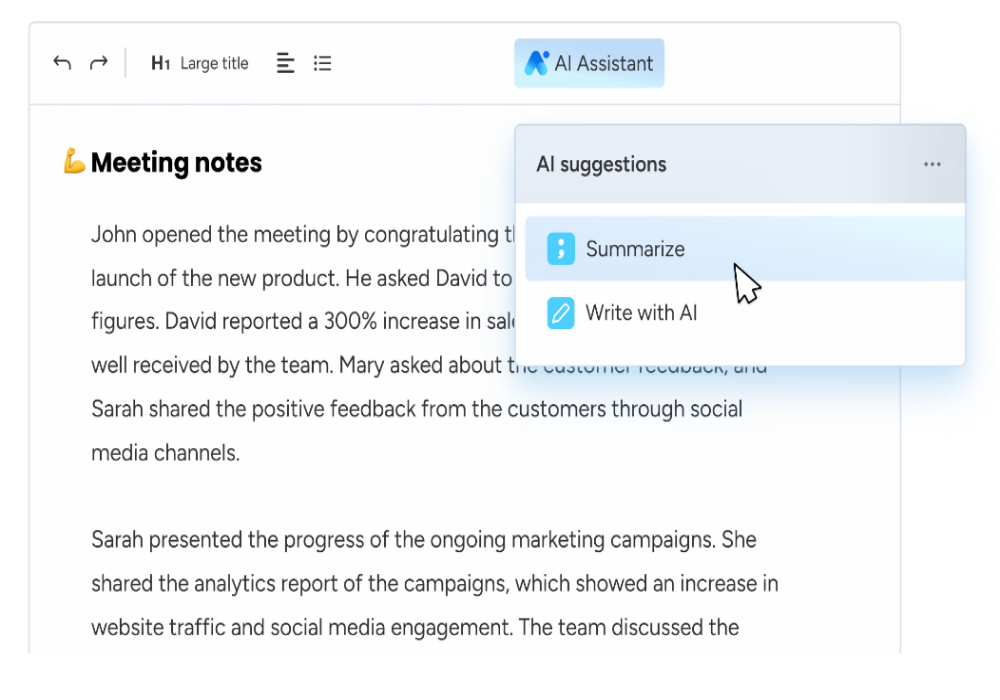
monday sales CRM pros and cons
| Pros | Cons |
|---|---|
| 14-day free trial. | Free tier only applies to students and nonprofits. |
| Custom templates for contact and deal management. | Insight and forecasting tools are only available though the Pro and Enterprise tiers. |
| iOS and Android mobile app. | Post-sale tools are only available through the Enterprise tier. |
How do I choose the best free CRM software for my business?
Now that we’ve given you a list of the top CRM providers with robust free versions, you need to narrow them down to find the software that best fits your goals. The next step would be to request demos or sign up for free trials from the providers that peak your interest. This way, you can begin communicating directly with the provider’s sales team and start onboarding the software.
Below are questions to consider asking when researching free CRM software:
- Does the free version offer the core features you need, such as list segmentation or advanced reporting?
- What is the total in-market expertise for your industry, if any?
- Is the CRM scalable and detailed enough to fit your small business or enterprise?
- Does the CRM software integrate with tools you already have in your tech stack?
FORUM: Here are some factors to consider when choosing a CRM.
Review methodology
To fairly review each provider’s free CRM offerings, we used an in-house rubric with outlined criteria and subcategories of CRM industry standards. After running each provider through that rubric, an algorithm calculated an overall rating and we used that to assign each software an ideal use case.
Here’s a breakdown of the scoring criteria we followed:
- Cost: Weighted 25% of the total score.
- Core features: Weighted 25% of the total score.
- Customizations: Weighted 15% of the total score.
- Integrations: Weighted 15% of the total score.
- Ease of use: Weighted 10% of the total score.
- Customer support: Weighted 10% of the total score.
[ad_2]